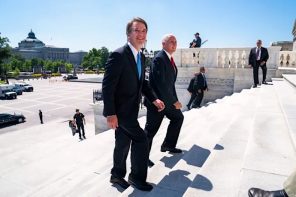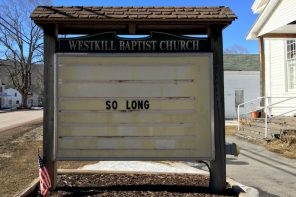As I reported earlier, it appears that the Obama administration’s new proposed rule (which of course is still subject to public comment) expands the type and number of religious organizations that can claim an exemption from covering contraception for their employees. Religious organizations that don’t qualify for the exemption can “self-certify” as one that is entitled to an “accommodation,” through which employees can obtain the coverage from an insurance plan separate from their employer’s.
In the main, reproductive rights organizations like Planned Parenthood and NARAL Pro-Choice America have praised the new rule. As I reported earlier, the U.S. Conference of Catholic Bishops is studying the rule, and I wouldn’t read that as a tacit endorsement. Studying a document like that before offering comment is the way the USCCB operates; rarely if ever does it issue an off-the-cuff assessment.
But the USCCB’s allies — other groups that oppose the contraception mandate — have wasted no time in lambasting the new rule as an inadequate protection of their constitutional rights. The Becket Fund for Religious Liberty, a legal group that has led the charge of litigation against the rule, claimed that the rule “leaves religious Americans at risk.” Becket claims the rule fails to protect for-profit businesses and their owners; that the expansion of the exemption beyond houses of worship was inadequate; and that the accommodation to provide coverage to employees of religious organizations that were not entitled to an exemption was “convoluted’ and “may not resolve religious organizations’ objections to being coerced into providing contraceptives and abortifacients to their employees.” (When Becket refers to abortifacients, it’s referring to ella and Plan B, drugs that are emergency contraception, not abortifacients, according to the medical community and the Food and Drug Administration.) Other organizations raising similar objections include Concerned Women for American, Americans United for Life, and the American Center for Law and Justice.
As to private employers, the proposed rule takes note of the fact that private employers are not entitled to religious exemptions under other federal laws, such as Title VII, prohibiting discrimination in employment. Based on that precedent, the administration declined to extend an exemption to private employers here.
The expansion of the exemption to religious entities other than houses of worship is more complicated. As I reported, Catholics for Choice, which, like Planned Parenthood and NARAL Pro-Choice America, supports full access to the coverage, is critical of the broader exemption. Catholics for Choice’s analysts say that the broader exemption (which resulted from eliminating a requirement that an organization employ and serve primarily people of its own faith to qualify for an exemption) would make Catholic schools and charities that are operated out of parishes and dioceses eligible for the exemption. This will, Catholics for Choice argues, increase the number of employees of Catholic organizations who would be deprived of contraception coverage, even if they aren’t Catholic themselves (or are Catholics who dissent from the church’s opposition to birth control).
HHS notes in its rule that “the exemption should not exclude group health plans of religious entities that would qualify for the exemption but for the fact that, for example, they provide charitable social services to persons of different religious faiths or employ persons of different religious faiths when running a parochial school. Indeed, this was never the Departments’ intention in connection with the 2011 amended interim final rules or the 2012 final rules.” (emphasis added) In other words, the administration claims it never intended to deprive a religious organization of an exemption if it was operationally connected to a church but served and employed people of different faiths. If that was the case, though, it seems odd that the administration, in the prior iteration of the rule, required organizations wanting an exemption to show that they hired and served primarily people of the same religious faith, two requirements it explicitly removed in today’s proposed rule.
By developing the accommodation for non-exempt, but objecting, religious organizations, it clearly looks like the administration is trying to maximize the number of women who have coverage. Women who work for religious employers, such as universities and hospitals, that have a separate tax-exempt existence from a church, will have access to contraception coverage separately from their employer’s plan.
But Catholics for Choice is raising a broader, long-term question: under what circumstances should religious exemptions be granted, either by statute or regulation? If the government starts granting such exemptions, and then broadening them, it sets a precedent. Where should the lines be drawn? Church-state separation advocates have long argued that too many religious exemptions are hidden away in legislation, and often are not constitutionally required to protect the religious freedom rights of those seeking them. And for an organization like Catholics for Choice, which breaks with church orthodoxy on contraception and abortion, another question raised by these exemptions is why a certain religious view gets protections but others do not.
There are dozens of lawsuits seeking to invalidate the contraception mandate in the courts — some brought by non-profits, and others by for-profit companies, which are not affected by the rule change. The question of whether the regulation violates the Religious Freedom Restoration Act or the First Amendment will reach the Supreme Court. The question of whether the new rule makes any of those lawsuits moot will also likely be litigated.
It’s one thing for the Court to decide when a law violates the religious freedom of a citizen, and another for political pressure to be applied by a particular religious group (or a collection of religious groups sharing a particular religious view) to gain an exemption from a generally applicable law. That’s why church-state separation advocates are this afternoon expressing concern that the administration too readily accommodated religious interests.
Barry Lynn, executive director of Americans United for the Separation of Church and State, said, “birth control is a fact of modern life. This proposed rule acknowledges that reality while going out of its way to accommodate religious groups.” Michael DeDora, director of Center for Inquiry’s Office of Policy, writes the group “is concerned that this is too broad and open a definition of ‘religious employer.'” He goes on:
Consider just a few questions: How will HHS determine what does and does not count as a “religious objection”? What does it mean for an outfit to “hold itself out as a religious organization”? For example, will a humanitarian organization with a devoutly religious board of directors that claims it directs the organization based on Biblical principles qualify for exemption? Or are there other qualities included in “holds itself out as a religious organization”? By what standards will HHS determine all of these questions?
These questions are not irrelevant merely because it appears women working for large religious employers will somehow get their contraception coverage. The exemptions matter — now, and later.



